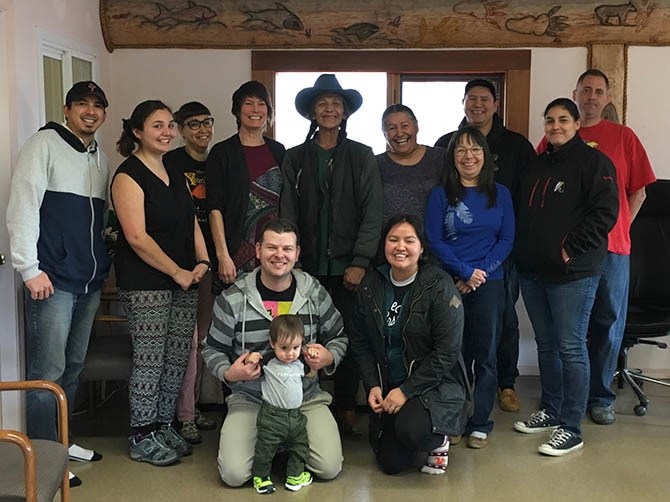
Students from the Sylix Language House during a recent visit from Elder Ulxanica.
Image Credit: SUBMITTED
June 23, 2017 - 7:15 PM
PENTICTON - Seventeen Okanagan First Nations students will be celebrating a milestone today in their efforts to bring their native language back to life.
Today, June 23 marks the halfway point of their participation in a four-year program that will deliver 2,000 hours of university-level language instruction of the indigenous language, Nsyilxcn.
The Sylix Language House formed in 2015 to begin bringing the adult learners to fluency using a combination of intensive curriculum and regular visits from elders fluent in the language.
The school operates in Penticton, which is a centralized location for the Syilx Nation.
Instructor Michelle Johnson says the 2,000 hour curriculum was created by the Salish School of Spokane, and teaches the language from beginner to advanced. This is the first time it has been taught from start to finish in Canada. The main goal of the language program is to create a body of First Nations people with advanced language skills.
Each student has their own reasons for taking the program, says Johnson, one major reason being to create a body of speakers proficient in the language.
Students come from Vernon, Westbank, Osoyoos and Keremeos to attend classes in Penticton. The program is supported by a number of Okanagan First Nations including the Osoyoos Indian Band, the Penticton Indian Band, the Okanagan Indian Band and Westbank First Nation. The First Peoples' Culture Council also provides funding. Other contributing organizations include Simon Fraser University Mitacs, the Okanagan Nation Alliance, the Sensisyusten School and the Outma Squlxw Cultural School.
“It takes an incredible amount of dedication to put in 2,000 hours of study and a network of support systems on behalf of their workplaces and families to make this happen,” Johnson says.
The Syilx language has fewer than 100 speakers remaining. Johnson says it has taken 100 years of effort to nearly erase the language and now will require an almost superhuman effort to relearn it.
“I am very grateful to all the language teachers who blazed a path before me,” she says.
When the students graduate, they won’t be fluent, but will be in the “mid to high layers of intermediate,” Johnson says, adding the language is very complex.
“We have a plan for people to get to fluency after they emerge from the program, but we have to set up full immersion workplaces for them next, and that’s going to be a really challenging step,” she says.
Each graduate needs an environment where their co-workers are fluent, followed by a workplace policy that encourages the language.
Johmson says interest among the Okanagan Nations to learn the language has always been there.
“It’s a really big part of who we really are,” she says.
A graduation ceremony celebrating the two year halfway point of the program was held at the Westbank First Nation today, June 23.
To contact a reporter for this story, email Steve Arstad or call 250-488-3065 or email the editor. You can also submit photos, videos or news tips to the newsroom and be entered to win a monthly prize draw.
We welcome your comments and opinions on our stories but play nice. We won't censor or delete comments unless they contain off-topic statements or links, unnecessary vulgarity, false facts, spam or obviously fake profiles. If you have any concerns about what you see in comments, email the editor in the link above.
News from © iNFOnews, 2017